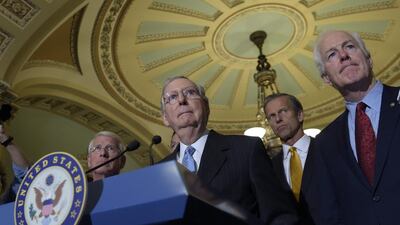It took less than 24 hours before Washington legislators were attempting to row back on last week’s vote by US Congress to overrule Barack Obama’s veto on families of 9/11 victims pursuing Saudi Arabia in domestic courts over alleged links to perpetrators of the attacks.
Senate majority leader Mitch McConnell said that lawmakers had not properly understood the full implications of the legislation: “nobody really had focused on the downside in terms of our international relationships,” he said. The White House for its part described these reservations as “a pretty classic case of ... buyer’s remorse.”
Provisions are already being considered to revise the law to better protect American personnel and interests overseas.
The US has its fingers in too many geopolitical pies to risk reciprocal action by sovereign states in whose sphere of influence it operates. Successive administrations have been alive to the dangers of exposing citizens, deployed globally as soldiers and diplomats, or US corporations and other entities, to legal liability from individuals, lawyers for NGOs, lobby groups or other groups contemplating legal action over aspects of US foreign policy. America’s decision to remain aloof from the International Criminal Court is testament to this.
If the US is to weaken the concept of sovereign immunity, then why not countries in which it has a strong military and diplomatic imprint, or who see themselves as adversely affected by US policy? What platforms for legal redress might be established over US military support for Israel, for instance, or over drone strikes in sovereign territories that cause collateral suffering and death?
In the case of the 9/11 families and Saudi Arabia, which was home to the bulk of the hijackers, we can see a growing trend towards the politicisation of legal process. In order to function properly, due process should enjoy immunity from politicians’ desire to please their voter bases, from the machinations of lobby groups and even from the heartfelt and heart breaking considerations of the victims of crime.
As Mr Obama said after the vote, this was a time for Congress to do the right and more difficult thing, rather than succumb as lawmakers to the genuine suffering, this side of a looming election, of the 9/11 bereaved.
Already the legal challenges have begun. Lawyers for the 9/11 families will now be able to proceed, on the basis of the less rigorous standards governing civil redress, with attempts to identify Saudi personalities and assets in the US with a view to ring fencing them for possible legal action.
The evidence for official Saudi links with the 9/11 hijackers is unconvincing if we are to go by the recent release of the so-called “28 pages” of hitherto sealed material from the 2002 congressional inquiry into the attacks, as well as by parallel vetting of its findings by intelligence officials. A statement after release by the House Intelligence Committee said: "it's important to note that this section does not put forward vetted conclusions, but rather unverified leads that were later fully investigated by the intelligence community.”
A statement from the chair of the Senate Intelligence Committee advised the public to consult related findings of the national intelligence services that "debunk many of the allegations contained in the declassified section of the report.”
Lawyers for the families will have to prove that a sovereign state with a history of diplomatic, trading, strategic, and military ties with the US suddenly decided, at an official level, to consciously support an act of terror against its ally. It is likely that only lawyers will emerge from this process happy
It is hard to see the affair prompting significant divestment by Saudi Arabia. What it does amount to is an important milestone in declining levels of trust between the US and that country – and by extension GCC members – all of whom have been strong allies of the US in terms of military cooperation, intelligence sharing and two-way investment.
It will be seen as in keeping with the administration’s apparent diplomatic drift away from its old allies towards Iran, whose ambitions across the region, it is felt, have been immeasurably bolstered by the US decision to spearhead the lifting of international sanctions on the country.
It will probably not result in a significant disruption of investment ties – which for the moment represent an important part of Saudi Arabia’s diversification plan – but the current trend towards looking eastward, rather than to the West, for investment opportunities and big-ticket procurement and infrastructure projects, will intensify.
Finally it will hasten polarisation in the Middle East, with the Gulf states especially no longer feeling that they are comfortable with life under a steadily more inconsistent US strategic umbrella, and seeking out instead new big-power alliances and/or unilateral solutions to perceived threats.
Martin Newland is a former editor in chief of The National

